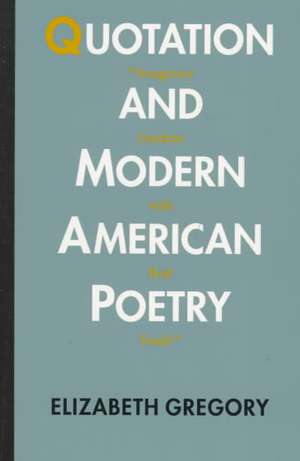Quotation and Modern American Poetry: "'Imaginary Gardens with Real Toads.'"
Autor Elizabeth Gregoryen Limba Engleză Paperback – 30 iun 1996
Gregory focuses on these issues through analysis of the use of quotation in modern and postmodern literature, a practice that was strikingly divergent from the accepted use of literary allusion.
Her introduction traces a history of quotation as it has been practiced in literature from classical to modern times. She then focuses on the texts of Eliot, Williams, and Moore--three central figures of American modernism whose work the author believes represents a spectrum of responses to the established European model of poetical discourse.
Gregory's selection of Moore also allows her to deal with feminist concerns as they emerge in the more general modernist dialogue. How was a female writer to make use of a literary canon that traditionally excluded female participation? "The implications of Gregory's argument . . . will surely be of especial interest to feminist scholars of American poetry."--Lois Parkinson Zamora, University of Houston.
Preț: 107.82 lei
Nou
Puncte Express: 162
Preț estimativ în valută:
20.63€ • 21.38$ • 17.22£
20.63€ • 21.38$ • 17.22£
Carte indisponibilă temporar
Doresc să fiu notificat când acest titlu va fi disponibil:
Se trimite...
Preluare comenzi: 021 569.72.76
Specificații
ISBN-13: 9780892633470
ISBN-10: 0892633476
Pagini: 256
Dimensiuni: 153 x 230 x 19 mm
Greutate: 0.45 kg
Editura: Texas A&M University Press
ISBN-10: 0892633476
Pagini: 256
Dimensiuni: 153 x 230 x 19 mm
Greutate: 0.45 kg
Editura: Texas A&M University Press
Notă biografică
Textul de pe ultima copertă
Why did quotation come into vogue among modernist American poets when, historically, allusion had been the preferred mode of intertextual reference? Elizabeth Gregory argues that quotation served as a site of these poets' struggle with questions of literary authority and, relatedly, of cultural and gender identity. While different poets quoted very different kinds of texts to very different effects, their shared reliance on quotation suggests their commonality of concerns - concerns that remain of interest in the postmodernist world, where quotation has become the prevalent artistic method. Gregory reads the efflorescence of poetic quotation as part of an attempt to redefine the sources of authority in the modernist world, in which traditional hierarchies of all kinds seemed to be disintegrating. For Americans and for women this breakdown offered an opportunity, since they had long occupied a secondary position in the reigning cultural and gender orders. But it was an opportunity with a cost, and not all poets welcomed it. Through close readings of T. S. Eliot's The Waste Land, William Carlos William's Paterson, and a selection of the poetry of Marianne Moore, the author explores the spectrum of modernist response to these issues and the ways in which each poet used quotation to establish a very different position of authority for him or herself. Eliot employs quotation to reassert old hierarchies and, by denying his Americanness, to claim a place of authority within them. Moore, oppositely, employs quotation as a means of questioning hierarchy and of laying claim to a kind of anti-authoritative authority for herself. Williams takes an insistently ambivalent position toward authority, represented most clearly in his schizophrenic attitudes toward gender.
